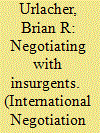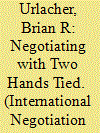| Srl | Item |
| 1 |
ID:
182675


|
|
|
|
|
| Summary/Abstract |
The colonization of the Northern Hemisphere between 1500 and 1900 produced nearly 150 separate conflicts between colonial powers and Native American communities. These conflicts have been largely overlooked in studies of international relations, particularly the quantitative tradition of scholarship. This article introduces a new dataset on conflicts involving Native American groups and colonial actors. As a starting point, this article briefly examines how the discipline has approached Native Americans and indigenous peoples. Next, the criteria for a new dataset on Native American Conflict History (NACH) is introduced. The challenges of navigating the historical record are discussed. And finally, a descriptive statistical overview of the data is presented that explores temporal and geographic patterns in the frequency, scale, and duration of conflicts. The article notes different patterns between European state combatants and ‘settler’ state combatants. Notably, the frequency of conflict increases dramatically in both Mexico and the United States during the second half of the 19th century while the scale of conflict remains largely unchanged.
|
|
|
|
|
|
|
|
|
|
|
|
|
|
|
|
| 2 |
ID:
123170


|
|
|
|
|
| Publication |
2013.
|
| Summary/Abstract |
Abstract High costs have long been seen as motivating conflict participants to seek peace. This article discusses two types of deviations from the "hurting-stalemate" logic: negotiations in the absence of high costs and non-negotiation in the face of high costs. Two prominent explanations for these deviations are discussed and evaluated, initially through a statistical analysis of peace overtures in intrastate conflicts and then through a case study of the Indian civil war in Kashmir. The results suggest that theoretical explanations focusing on the preferences and political strength of leaders have traction at all levels of violence. Variables associated with shifts in perception, such as leadership change or political shocks, seem to have different effects as the level of violence in a conflict changes.
|
|
|
|
|
|
|
|
|
|
|
|
|
|
|
|
| 3 |
ID:
167453


|
|
|
|
|
| Summary/Abstract |
Theories of conflict resolution often posit unified actors as a simplifying assumption. In practice conflict actors often struggle to balance competing factions and centers of power. Schelling and Putnam have argued that factors that constrain what a negotiator can accept are a potential source of leverage in a bargaining process, yet a counter argument suggests that leaders seeking to negotiate, while facing divided government, may be less able to credibly signal their intentions. Drawing on event data from nearly 3,000 conflict-months, this paper analyzes the frequency of concessions offered by both rebels and governments. This study finds evidence that a fractured decision-process results in both rebels and governments making more concessions. Further corroboration is provided through a case study of the Philippine government’s efforts to negotiate an end to the conflict in the Mindanao region.
|
|
|
|
|
|
|
|
|
|
|
|
|
|
|
|
| 4 |
ID:
107798


|
|
|
|
|
| Publication |
2011.
|
| Summary/Abstract |
This article explores the effect of political and institutional constraints on negotiations that seek to end civil wars. Two aspects of negotiations are statistically examined. Greater political constraints on the leaders of states appear to have no effect on the likelihood of negotiations taking place, but greater political constraints do reduce the likelihood of negotiations succeeding. The results of this analysis demonstrate that political constraints are a powerful factor driving the likelihood of negotiation success. The article concludes with a discussion of why political constraints do not produce a similar reduction in the likelihood of negotiations.
|
|
|
|
|
|
|
|
|
|
|
|
|
|
|
|
| 5 |
ID:
087996


|
|
|
|
|
| Publication |
2009.
|
| Summary/Abstract |
How news coverage is affected by dangerous security environments is an important issue for political scientists who rely upon journalistic accounts of political events. It is also a controversial issue in the policy arena. In June of 2004, Deputy Defense Secretary Paul Wolfowitz attributed the American public's pessimism regarding U.S. efforts at stabilizing Iraq to the manner in which Iraq was covered by the U.S. media, suggesting that journalists in Iraq were holed up in hotels rather than in the field. This statement was conjecture, but if there is indeed a link between news coverage and violence, then this would be important for social scientists to understand. In this article, I probe this link by examining how conflict intensity and journalist deaths affect both the volume and length of news coverage in civil wars from 1992 to 1999. This paper shows that news coverage is largely unaffected by violence, except in the most extreme circumstances.
|
|
|
|
|
|
|
|
|
|
|
|
|
|
|
|